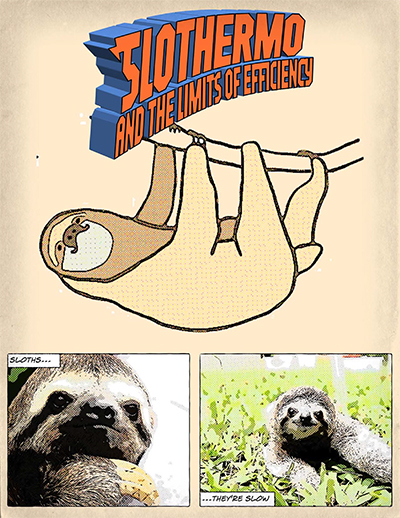
A graphic novel produced by students in one of Leon Liebenberg's courses. The novel explores the efficiency of various energy sources.
Via ENGINE, a Group of Illinois Educators Promote Using Playful Pedagogies to Engage Students
April 10, 2019
While Illinois students receive a good education and are highly sought after once they graduate, a group of Illinois faculty and educators believe faculty can do an even better job of engaging students and thus improving their education. So a multidisciplinary team of educators with similar goals of increasing student engagement are collaborating in a new program called ENGINE: ENGagment In eNgineering Education, whose focus is for not just engineering faculty but all Illinois faculty to move beyond traditional teaching methods to explore a number of engaging new pedagogical strategies. A key objective, along with engaging students, is to share their passion for playful learning with other educators by developing new resources then assessing the impact of these teaching pedagogies to share with other faculty, both on campus and beyond.
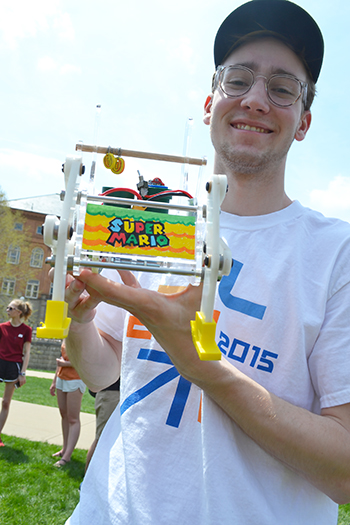
One of Leon Liebenberg's students exhibits the walker he and his teammates designed which he has just finished racing during the competition. To see the process the team went through to design and build the Super Mario, click here to see teammate Kate Malmsbury's e-portfolio.
ENGINE is comprised of a multidisciplinary team of nine educators from across campus. According to Mechanical Science and Engineering (MechSE) senior lecturer Leon Liebenberg, its multidisciplinary mix was intentional. He shares that C. P. Snow, in his 1960’s booklet, The Two Cultures, describes a split between the humanities and the sciences. While the two domains are mostly still segregated in discipline silos today, “People are acknowledging that fire/innovation happens when the two disciplines can collaborate,” Liebenberg says, adding: “Also, engineers (and scientists) can use techniques that are usually found in the humanities, like role-play and playful thinking, with amazing results. Conversely, humanists can use tools usually used by engineers (and scientists), like coding and systems-thinking, with equally amazing results.”
Liebenberg explains why he’s so passionate about using playful pedagogies that cross disciplines to engage students: “It’s this mash-up of ideas and disciplines that our students apparently like and crave, especially if it means that they have more autonomy in their learning and if the results of their projects are super-creative. I’m all for self-directed learning, as you know!”
So focusing on their mutual espousal of pedagogies of engagement, the ENGINE group recently submitted a revised proposal to SIIP (Strategic Instructional Innovations Program), part of the College of Engineering’s AE3 (Academy for Excellence in Engineering Education). According to its website, SIIP seeks to encourage faculty to “teach like we do research” and, similar to high-quality research programs at Illinois, seek “collaboration, creativity, excitement, measurement, perseverance, and continual improvement.” So, the ENGINE group is striving to do just that.
Moving beyond traditional content delivery, their teaching explores diverse pedagogical strategies focused on playful techniques in order to improve classroom engagement. They are embracing:
- community building
- self-directed learning
- ePortfolios
- augmented and virtual reality apps
- graphic novels and comics
- interaction with real-world specialists
- role-play
- competitions and
- low-fidelity prototyping activities.
For instance, as a nod to community building, students work in teams to apply the diverse course concepts via the above techniques. Also, students express course concepts in graphic novels or augmented/virtual reality apps.
Plus, different ENGINE members espouse different playful techniques. For example, Shelly Schmidt, a Professor in Food Science and Human Nutrition (FSHN) and also Agricultural and Biological Engineering, has implemented a community-building activity, All About Me. This syllabus excerpt explains her goal. “Creating Community is a vitally important aspect of meaningful and enjoyable learning. Being a part of a community helps students feel more involved and connected, and thus, helps them want to learn the course content more deeply. The goal of the All About Me assignment is to help build community in FSHN 101 by sharing a little about yourself with your classmates and the teaching team.”
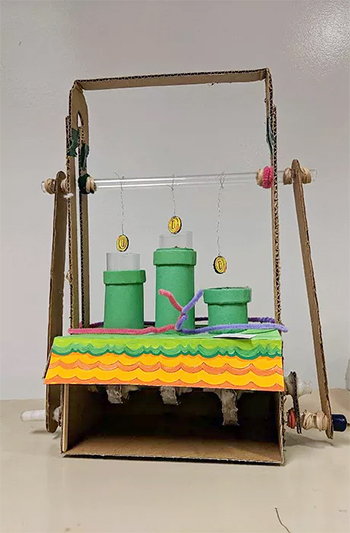
A low fidelity prototype of the Super Mario walker shown above.
For the assignment, students were to produce 2–3 minute videos about themselves (their name; where they’re from; an interesting or unique fact about themselves; and how they got interested in FSHN, then upload their video (worth 20 points) to the course website.
Schmidt’s learning-through-play philosophy is based on research like M.H. Immordino-Yang’s 2016 work stating that the “connection between emotion and cognition” produces insights with “the potential to inform and transform educational practices.” Schmidt explores one of Immordino-Yang’s insights: “We really only think deeply about the things we care about (p. 18).”
“If you think about it,” Schmidt continues, “when is the last time you Googled something that you really didn’t care about? Probably never—our brains are wired to focus on things that are important to us, things that we care about.” She explains that for learning to be meaningful and useful, “Students need to be engaged with and connected to the material they are learning about—they need to care about it. Play is one avenue to help students engage with and connect to, and thus care about, what they are learning.”
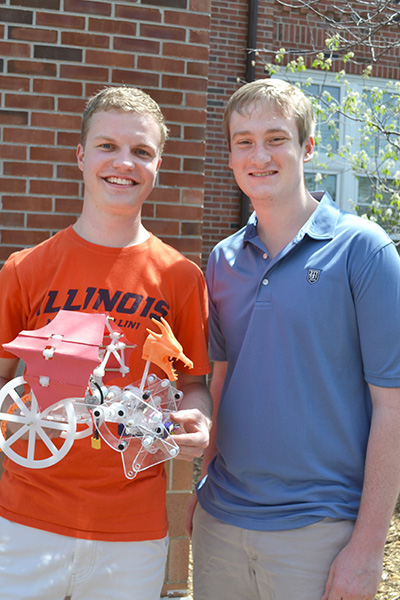
Two of Liebenberg's spring 2018 ME370 students, Evan Wahl and his teammate Tom Penicook, show off their walker, Todd the Dragon during the final event of the spring 2018 ME370 automaton competition.
Leon Liebenberg is hooked on practically all of the ENGINE pedagogical strategies. For instance, in his four courses, he fosters self-directed learning; interaction with real-world specialists; and role play, which encourages students to consider problems from different perspectives. He fosters community via teamwork. He has students create self-reflection ePortfolios, where they “critically appraise their own learning,” focusing more on “’What have you done?’ and ‘What are you like?’ rather than only ‘What do you know?’” His students apply course concepts via augmented and virtual reality apps and graphic novels, and communicate complex concepts simply using social media. Plus, he employs competition, which he calls “process oriented,” adding that the “means are more important than the ends,” and claiming that it “actively engages students” while encouraging them to respect other points of view.
Another ENGINE member, Molly Goldstein, an Industrial and Enterprise Systems Engineering Senior Lecturer, employs student design projects. Her SE101B students team up to understand and model products with mechanical movement (manual coffee grinders, hand mixers, toy quadcopters, or Da Vinci clocks).
“They ‘get their hands dirty’ dissembling the product to re-engineer and model,” she explains.
Her SE101A students work in teams to read (sometimes ancient) blueprints of a campus building which they then model.
“They have a lot of fun re-creating a building that exists and that they can explore,” she explains. “They also seem to play with all of the small details (such as lighting and room layouts) that make their models more realistic.”
In addition to teaching, Goldstein is the Director of IESE’s Product Design Lab, a design space for students/student groups and class projects, which is part of the new Carle Illinois College of Medicine’s Health Maker Lab network. Completely dedicated to student engagement, on any given day, the lab is a resource for: students dissecting products; Engineering Graphics and Design project teams; students collaborating on Computer-Aided Product Realization; students doing reverse engineering (3D printing, 3D scanning), digital prototyping, and concept design; international students from Engineers without Borders; and CAD–based engineering education research activities exploring various topics.
While ENGINE members have similar goals regarding the use of engagement pedagogy, their roles in the group might differ: some are primarily teachers while other members help provide support to those teachers. For instance, since Robert Baird, Associate Director of the Center for Innovation in Teaching & Learning (CITL) supports teaching and learning across campus, his role in ENGINE similarly involves drawing upon his experience to help other group members with their teaching and technology use. One impact he’s had is sharing some of his more playful assignments with ENGINE members. In fact, he shared one of his favorites, graphic novels, with Liebenberg, who has been successfully implementing these into the courses he teaches ever since. Another of his assignments is to have students create memes to introduce themselves to their classmates at the beginning of the semester.
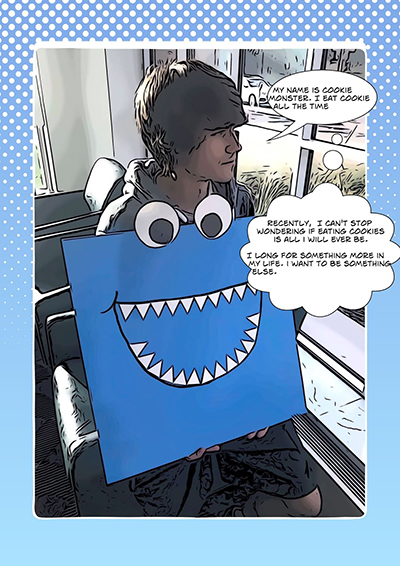
An image from a Cookie Monster comic, "Story of R134A: Analysis for Chiller Plant of UIUC Campus," developed by students in Liebenberg's Fall 2018 ME 200 course.
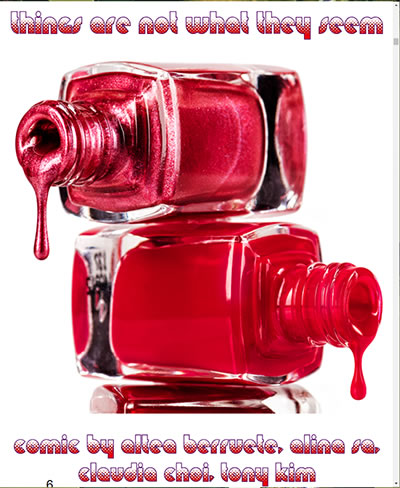
An image from Human Bias Graphic Novels developed for Baird's spring 2018 new media course.
Also an Assistant Professor in Media and Cinema Studies, Baird typically teaches new media courses, where students explore older (cinema and television) as well as newer media technologies (video games, web-based media, social media, virtual reality, etc.), employing course portfolios to showcase their work. Because Baird’s students are typically from majors outside of media and not pursuing careers as media professionals, but jobs that work with or support media, such as communications, advertising, etc., he typically approaches assignments “in a more playful, creative way, and not as a media-based assignment solely for students who soon will be young media professionals.”
What’s Baird’s philosophy regarding the benefit of these types of activities? “Playful pedagogies are largely about setting a fun, creative environment for students that allows them to relax and work in teams in an easy, collaborative way,” he says.
Plus, he doesn’t give tests or quizzes or 5 page papers. “Instead,” he admits, “students have to create lots and lots of projects, videos, infographics, posters, 360 images, and so forth. Doing ‘course work’ in this context is hard and takes effort, but it’s ultimately enjoyable and rewarding and kinda like play!”
Research and Dissemination
However, ENGINE folk are not just exploring new pedagogical strategies that engage students, they’re also conducting research to explore the relationship between these playful pedagogies, student engagement, cognition, and emotion. For instance, Liebenberg, Goldstein, and MechSE graduate student Alex Pagano analyzed results from questionnaires handed out to students in his ME 200, Thermodynamics course last semester. Liebenberg reports, “The results are extremely encouraging and indicate that students enjoy self-directed learning.”
Plus, in addition to developing learning resources for and teaching using pedagogies of engagement, another key ENGINE goal is to distribute them. Dissemination strategies include a matrix mapping engagement pedagogies with curriculum; disseminating findings via peer-reviewed journals, case studies and video vignettes, workshops, seminars, and conferences; and establishing a community of practice with instructional peers to communicate the value of these approaches through discussions and collaborations like informal co-teaching and observations.
For example, Shelly Schmidt recently published an editorial in the Journal of Food Science Education (Vol. 16, 2017), What Does Emotion Have to Do with Learning? Everything! regarding her deep reading of deep reading of M. H. Immordino-Yang's 2016 book, Emotions, Learning, and the Brain.
Also, at the American Society of Engineering Education annual meeting in June 2019, Liebenberg, Goldstein, and Pagano will be presenting an article, Play-in-learning: Studying the impact of emotion and cognition in undergraduate engineering learning, which details the results of their research about Liebenberg's ME 200, Thermodynamics course.
As part of ENGINE's dissemination strategy, its members have also been sharing about playful pedagogies at events, such as the April 4th–5th Playful by Design Symposium: The Future of the Playful University, where Liebenberg teamed up with School of Information Sciences Senior Lecturer Judith Pintar, the Director of Informatics’ Electronic Literatures and Literacies Lab, to present, “Hailing the Whole Student in a Fragmented Academy.” The two shared their experiences with playful pedagogies that simultaneously engage students in literature, engineering, systems-thinking, graphics, coding, design-thinking, role-playing, and meta-cognition.
Liebenberg began his presentation by addressing the fragmented nature of higher education today:
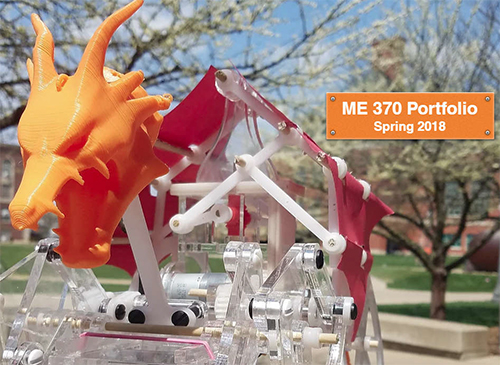
Cover of Evan Wahl's e-portfolio, featuring his walker, Todd the Dragon. (Image and website courtesy of Evan Wahl.)
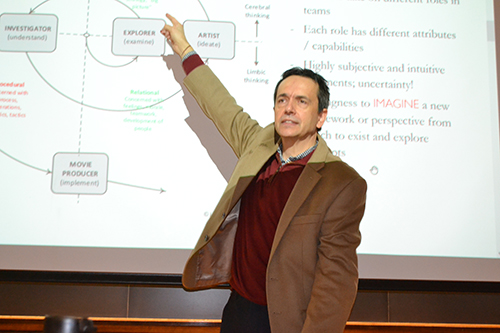
Leon Liebenberg presenting about his adventures with playful pedagogies during the recent Playful by Design Symposium.
“We sometimes feel isolated in our research, our service, and our teaching,” he claims, adding that, “Our students are not—at least when they start college—creatures of the silos that so many of us call home. And many of us feel called to keep our students curious and broad-minded, to cultivate the whole person as we design courses and activities in which students are personally invested.”
He invited teachers to repudiate discipline-related silos, claiming that by “Trespassing and collaborating across diverse disciplines, remixing lessons and materials from all over the university, desegregating reason and emotion, we can call the whole student to the learning experience—and hopefully find the whole teacher there as well. Liebenberg was hopeful that sharing examples of playful pedagogy he has implemented might encourage members of the audience to also adopt more "playful" ways of teaching in order to “undermine many of the false dichotomies and invidious comparisons that plague the academy and isolate us from one another.”
Also representing ENGINE was CITL E-Learning professional Ava Wolf, whose presentation “New Classrooms; New Teaching Opportunities” reported that faculty will soon have access to a wider variety of active learning classrooms and, thus, more opportunities for student interaction. She encouraged instructors to “Get ready to enhance your teaching in classrooms designed to support active and collaborative learning!”
Wolf and Baird participated in an interactive discussion forum, “Fun and Games in the Context of Teaching: How Words Can Help and Hinder,” seeking to convey the idea that words such as “fun, play, and games” can mean different things to different people, especially in regards to the value of play in classroom teaching. So they sought to impart the idea that playful pedagogies, while termed “playful,” can play a serious and important role in active learning.
For some graphical novels by Liebenberg's students, see:
- A Stirling Adventure by Justin Frank, Connor Latham, Vera Liu, & Michelle McCord
- Slothermo by Blake Banks, Sheikh Farhan, Nathan Griffin, & Milos Popovic
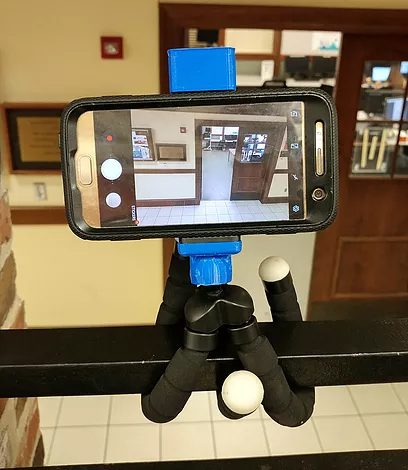
A redesigned VR Headset produced by students in Leon Liebenberg's fall 2018 ME270 Design for Manufacturabiity course. This photo appeared in the team's end-of-the-semester main project e-portfolio. (Photo taken from the team's e-portfolio).
Story by Elizabeth Innes, Communications Specialist, I-STEM Education Initiative. Photographs by Elizabeth Innes unless otherwise noted.
Other I-STEM articles about playful pedagogy:
- Liebenberg’s ME 270 End-of-Semester Main Project Presentations Showcase Students’ Manufacturability Redesigns
- ME370’s Final Competition—March of the Automata—Fosters MechSE Students’ Creativity, Perseverance, and Teamwork
More: Faculty Feature, MechSE, Undergrad, 2019
Below: Students in Goldsteain's SE101B course dissemble a product. (Image courtesy of Molly Goldstein.)
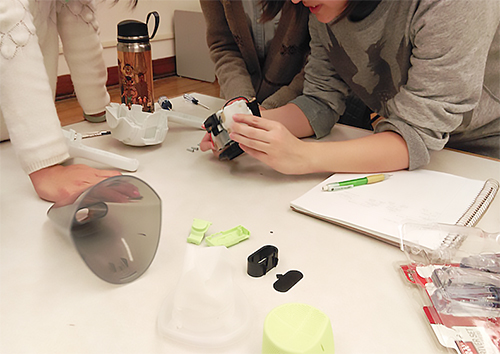
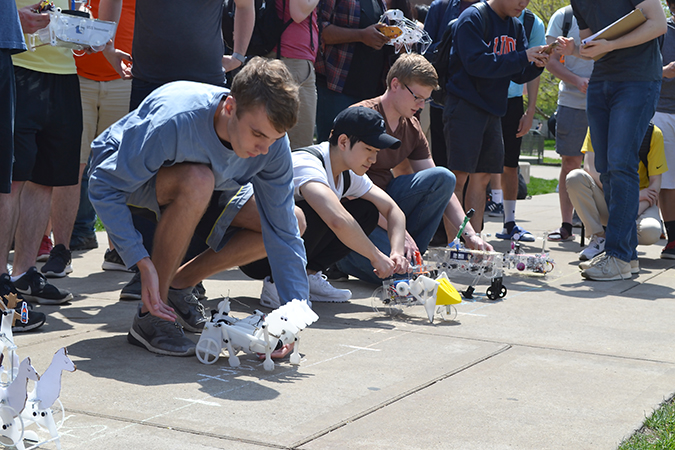
Spring 2018 ME370 students prepare to race their walkers during the end-of-the-semester March of the Automata competition.
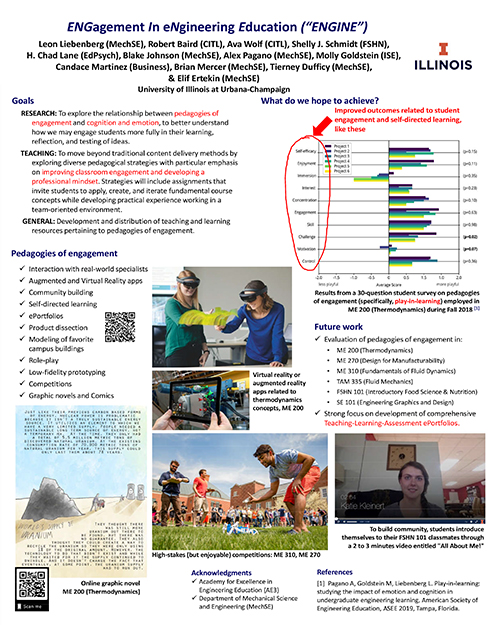













.jpg)
















